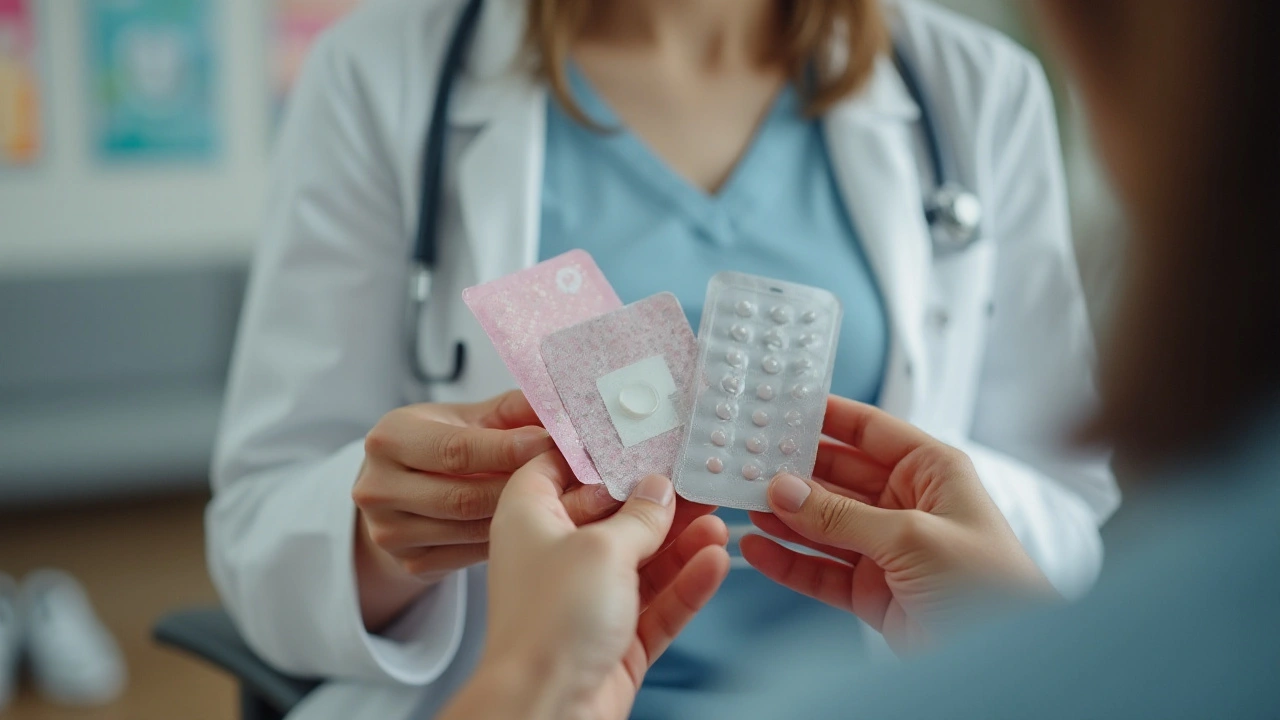Experiencing vaginal burning can be distressing and confusing, especially when trying to pinpoint the exact cause. Many women might not be aware that their method of contraception could be contributing to this discomfort.
Let’s break down the possible reasons why this happens and explore the connection between contraceptive use and vaginal burning. We'll cover the causes, the effects of different contraceptives, and provide some practical advice on handling these issues. Plus, we'll guide you on when it’s time to consult a healthcare professional.
- Causes of Vaginal Burning
- Types of Contraceptives and Their Effects
- Practical Tips for Relief
- When to Seek Medical Advice
Causes of Vaginal Burning
Vaginal burning is a common and uncomfortable sensation that many women may face at some point in their lives. The causes of vaginal burning can be multifaceted, ranging from infections to reactions to products, and even lifestyle choices.
One of the primary causes of vaginal burning is infections. Yeast infections, for instance, are a prevalent culprit. They occur when there is an overgrowth of the fungus Candida. This can lead to itching, discharge, and a burning sensation. Bacterial vaginosis is another common infection that can cause vaginal burning. It happens due to an imbalance of natural bacteria in the vagina.
Irritants, such as scented soaps, lotions, and feminine hygiene products, are also known to cause vaginal burning. Even certain laundry detergents and fabric softeners can be problematic. These products contain chemicals that can disrupt the natural balance of the vaginal flora, leading to irritation and discomfort.
Hormonal changes can play a significant role as well. For example, during menopause, estrogen levels drop, which can cause the vaginal walls to thin and become dry. This condition, known as vaginal atrophy, can lead to burning and irritation. Birth control pills and other hormonal contraceptives can also cause changes in vaginal sensitivity and flora, leading to burning sensations.
Another potential cause of vaginal burning is sexually transmitted infections (STIs). Infections like chlamydia, gonorrhea, and genital herpes can all lead to painful symptoms, including burning. Regular screenings and prompt treatment are essential to manage these conditions and prevent complications.
In some cases, the use of certain contraceptives can lead to vaginal burning. Spermicides, for example, contain chemicals that can be harsh on sensitive vaginal tissues. Some women might also react to the latex in condoms or the materials in diaphragms and cervical caps, leading to irritation and burning.
It's crucial to pay attention to any new products or contraceptives you introduce into your routine. If vaginal burning occurs, reconsider their use or consult with a healthcare provider about alternatives. Always be mindful of any changes in your body and seek professional advice if the burning sensation persists.

Types of Contraceptives and Their Effects
When it comes to managing intimate health, understanding the impact of different contraceptives on your body is crucial. Each contraceptive method can have unique effects, and it’s not uncommon for some to contribute to vaginal burning. Let's explore these types and their potential side effects.
Hormonal Contraceptives
Hormonal contraceptives, including birth control pills, patches, injections, and rings, are popular due to their effectiveness. They work by regulating hormones to prevent ovulation. However, these hormones can also affect the vaginal environment, possibly leading to dryness and irritation. This dryness can manifest as a burning sensation.
For instance, the pill alters hormone levels, reducing natural lubrication and increasing the risk of yeast infections. Similarly, the contraceptive ring releases a steady flow of hormones, which can also disrupt the natural balance of bacteria and yeast in the vagina. Women using hormone-based methods should be vigilant about symptoms and consider discussing alternative options with their doctor if discomfort persists.
Intrauterine Devices (IUDs)
IUDs are small devices inserted into the uterus, either containing hormones or made of copper. Copper IUDs work by creating a hostile environment for sperm, but they can also cause local inflammation or irritation. This inflammation might lead to vaginal burning in some cases.
Hormonal IUDs, like Mirena, release small amounts of progestin locally in the uterus. While their localized hormone release reduces systemic side effects, they can still cause changes in vaginal secretions and contribute to dryness or irritation. Though many women tolerate IUDs well, monitoring for any signs of discomfort is essential.
Barrier Methods
Barrier methods, such as condoms, diaphragms, and spermicides, provide a physical block to prevent sperm from reaching the egg. However, certain materials or chemicals in these products can cause irritation. Latex condoms, for example, may cause allergic reactions leading to itching and burning. Spermicides can disrupt the natural pH balance, causing discomfort.
Switching to hypoallergenic or non-latex condoms can help alleviate allergic reactions. Similarly, using non-spermicidal lubricants may prevent pH imbalance, reducing the risk of burning sensations.
According to Dr. Emma Miller, a gynecologist from the Women’s Health Institute, "It’s important for women to be aware of how different contraceptive methods affect their bodies. Open communication with healthcare providers can make a significant difference in choosing the right method."
Natural Methods
Natural contraceptive methods, such as fertility awareness and withdrawal, do not involve chemicals or devices. These approaches rely on tracking ovulation cycles or withdrawing before ejaculation. They tend to have fewer side effects related to vaginal health, but they demand diligence and may not be as reliable as medical methods.
Although natural methods do not directly cause vaginal burning, it’s vital to stay mindful of other factors like diet and hygiene, as these can also impact intimate health.

Practical Tips for Relief
For many women, experiencing* vaginal burning* while using contraceptives can be incredibly frustrating and even painful. Finding relief doesn't need to be a long and arduous journey. Here are some effective and practical tips to help alleviate that discomfort.
First and foremost, it's crucial to keep the vaginal area clean and dry. Using mild, fragrance-free soap and warm water can help maintain a balanced pH level, which is essential for reducing irritation and burning sensations. Avoid using harsh soaps or douches as they can disrupt the natural flora of the vagina.
Switching to hypoallergenic or organic menstrual products can also provide much-needed relief. Many commercial tampons and pads contain chemicals and fragrances that may irritate sensitive skin. By choosing products made from organic cotton and free of dyes, you reduce the risk of additional irritation.
Another important tip is to wear breathable, cotton underwear and avoid tight-fitting clothes. Wearing synthetic fabrics or overly tight clothing can trap moisture, creating an environment where irritation and burning can thrive. Allowing your skin to breathe can significantly reduce these uncomfortable symptoms.
Using a water-based lubricant can alleviate dryness often associated with vaginal burning. This is especially true if the burning is experienced during intercourse. Opt for lubricants that are glycerin-free and formulated for sensitive skin to avoid any potential irritants.
More often than not, hydration plays a pivotal role in maintaining overall vaginal health. Drinking plenty of water helps keep the entire body hydrated, including the vaginal tissues. This can minimize dryness and, consequently, reduce burning sensations.
A balanced diet rich in vitamins and probiotics can also contribute to better vaginal health. Consuming foods with high levels of vitamin C, E, and B-complex, as well as incorporating probiotic-rich foods like yogurt and kefir, can promote a healthy vaginal environment.
Consider changing your contraceptive method if you suspect it might be the cause of the burning. Some women find that switching from hormonal contraceptives to non-hormonal options, such as copper IUDs or condoms, alleviates their symptoms significantly.
According to Dr. Jill Krapf from the Center for Vulvovaginal Disorders, "Using the right contraceptive method for your body can make a world of difference in vaginal comfort and overall sexual health."
Always consult a healthcare professional if self-care measures do not relieve the symptoms. Sometimes, a prescription for a topical cream or a change in contraceptive method may be necessary to fully address the issue. Your doctor can provide personalized recommendations based on your specific needs and medical history.
Implementing these practical tips can lead to noticeable improvements in discomfort and help maintain vaginal health. By taking proactive steps, you can manage and reduce the effects of vaginal burning while continuing to use your chosen contraceptive method effectively.

When to Seek Medical Advice
If you find yourself battling vaginal burning and discomfort, and you haven't been able to pinpoint a clear cause, it may be time to reach out to a healthcare professional. While occasional irritation can happen to everyone, persistent or severe symptoms should not be ignored.
One of the key indicators that you should see a doctor is if the burning sensation is accompanied by unusual discharge, a strong odor, or changes in the color or texture of the discharge. These symptoms could indicate an infection, which requires prompt medical treatment.
Another situation where medical advice is necessary is if you experience intense pain, not just burning. Pain that disrupts your daily activities or your sleep is a clear sign that something might be wrong. It’s especially crucial if the pain occurs during or after sexual intercourse, or while urinating.
If you’ve recently started using a new contraceptive method and the discomfort began shortly afterward, it’s a good idea to revisit your healthcare provider. Contraceptives like spermicides, condoms with spermicidal lubricants, or hormonal methods can sometimes lead to irritation or allergic reactions. Your doctor might suggest alternative methods that are gentler on your body.
Furthermore, if over-the-counter treatments and home remedies fail to alleviate your symptoms, professional guidance is essential. Prolonging treatment could worsen an underlying condition, making it harder and longer to treat effectively. As one doctor put it in a recent health journal,
“Early diagnosis and treatment can prevent complications and promote better health outcomes.”
It’s also wise to seek medical advice if you have any existing health conditions, such as diabetes or a weakened immune system, that could complicate infections or vaginitis. These conditions might make you more susceptible to recurring issues, and a tailored treatment plan can help manage both the burning sensation and your overall health.
Always remember, your health should be a priority. If something feels off, it’s better to be cautious and get it checked out. Medical professionals are there to help, and ignoring symptoms won't make them go away. Rather, proactive steps can lead to quicker relief and peace of mind.


Trina Smith
September 20, 2024 AT 16:07When we look at the body as a landscape, every change-like a subtle burn-asks us to listen to the signals it sends 🌿. Contraceptives can shift the micro‑ecology, and sometimes that shift feels like a tiny ember. It’s not just a medical issue; it’s a dialogue between our choices and our bodies. 🤔
josh Furley
September 20, 2024 AT 16:24Most people blame the pill for everything, but the real culprit is often the douching habit-micro‑flora disruption is a bigger factor than hormones. In other words, the “burn” is usually a symptom of pH imbalance, not a direct side‑effect of contraception.
Jacob Smith
September 20, 2024 AT 16:40Hey, don’t stress! 👊 If u notice a burn, try switching to a fragrance‑free soap and give your lady parts a break from spermicides. A little water‑based lube can work wonders and you’ll be back to feeling comfy in no time.
Chris Atchot
September 20, 2024 AT 16:57Wow!!! That article really covers a lot!!! I love how it mentions both hormonal and non‑hormonal options!!! It’s important to check the ingredients!!! And don’t forget to keep the area clean!!!
Shanmugapriya Viswanathan
September 20, 2024 AT 17:14India’s traditional practices have always respected natural balance, unlike many western chemical contraceptives 😤. If you want a solution that honors the body, look into Ayurvedic methods 😊.
Rhonda Ackley
September 20, 2024 AT 17:30I have to say, reading this piece made me feel like I was on an emotional roller coaster that never quite stops. The detailed breakdown of each contraceptive type reads like a novel, each paragraph unfolding a new drama of potential misery. Hormonal pills, for instance, are portrayed not just as a medical tool but as a thief that steals natural lubrication, leaving women in a constant state of dryness. Then there’s the IUD, which the author describes as a tiny device that can cause inflammation, an invisible aggressor nestled deep inside the uterus. The copper IUD is depicted as a metallic menace, and while some women swear by it, the article hints at a subtle, burning irritation that could flare up without warning. Barrier methods get a similar treatment, with latex condoms described as potential allergens that turn intimacy into a battlefield of itching and burning. The narrative continues, painting spermicides as chemical saboteurs that upset the pH balance, making every encounter feel like walking on a hot stove. It doesn’t stop there; the piece also covers natural methods, yet even they are not exempt from criticism, as the author warns that neglecting diet and hygiene can still result in discomfort. Throughout, the tone feels both educational and alarmist, as if warning us of hidden traps lurking behind every contraceptive choice. Practical tips are offered, but they read like a list of chores-switch your soap, wear cotton underwear, stay hydrated-simple steps that seem almost too basic for the complexity painted earlier. I can't help but notice the repeated emphasis on consulting a healthcare professional, which feels like a safety net constantly dangling before us. The article concludes with a call for vigilance, a reminder that our bodies are ecosystems that demand respect and careful monitoring. All in all, this piece walks a fine line between empowering readers with knowledge and instilling a lingering sense of dread about something as routine as birth control.
Sönke Peters
September 20, 2024 AT 17:47Good overview, thanks.
Paul Koumah
September 20, 2024 AT 18:04Sure, just skip all birth control and hope for the best.
Erica Dello
September 20, 2024 AT 18:20Honestly if you keep using harsh chemicals you deserve the burn stop ignoring your body 🌱
sara vargas martinez
September 20, 2024 AT 18:37There is a substantial body of literature that establishes a correlation between exogenous hormones and alterations in the vaginal microbiome, and this is not merely anecdotal. Studies published in peer‑reviewed journals such as the Journal of Women’s Health consistently demonstrate that estrogenic compounds can reduce Lactobacillus dominance, creating an environment conducive to opportunistic pathogens. Moreover, the physicochemical properties of spermicidal agents, particularly nonoxynol‑9, have been shown to compromise epithelial integrity, leading to increased susceptibility to irritative sensations and even ulceration in severe cases. It is also critical to acknowledge that individual variability in enzyme activity, such as cytochrome P450 isoforms, influences how these hormonal agents are metabolized, thereby affecting the intensity and duration of side‑effects. The type of contraceptive device also matters; copper IUDs release ionic copper which, while efficacious as a spermicide, can incite a localized inflammatory response that patients may perceive as burning. In contrast, hormonal IUDs release levonorgestrel locally, often resulting in reduced systemic exposure but still capable of altering mucus consistency and pH levels. The interplay between these factors underscores the necessity for personalized medicine approaches when selecting a contraceptive method. Lifestyle factors-dietary intake of probiotic foods, hydration status, and even stress levels-modulate the resilience of the vaginal epithelium and should be part of any comprehensive management plan. Ultimately, the decision should be informed by a thorough risk‑benefit analysis conducted jointly by patient and provider, taking into account both the physiological implications and the psychosocial context of contraceptive use.
Todd Anderson
September 20, 2024 AT 18:54In light of the preceding discussion, it is incumbent upon clinicians to furnish patients with a detailed exposition of the mechanistic pathways through which various contraceptive modalities may engender vulvar discomfort. Such elucidation must be rooted in empirical evidence and conveyed with unwavering clarity.
Dexter Smith
September 20, 2024 AT 19:10The data presented lacks statistical rigor; without a controlled cohort the conclusions are speculative at best.
Cherish Capps
September 20, 2024 AT 19:27Hey folks, remember to trust your gut-if something feels off, it probably is. A quick chat with your doc can save a lot of hassle later.
Amy Carpenetti
September 20, 2024 AT 19:44Each method has pros cons and personal preference matters most
Paul Griffin
September 20, 2024 AT 20:00It is advisable to maintain open communication with your healthcare provider, ensuring that any adverse sensations are promptly addressed and appropriate adjustments are made.